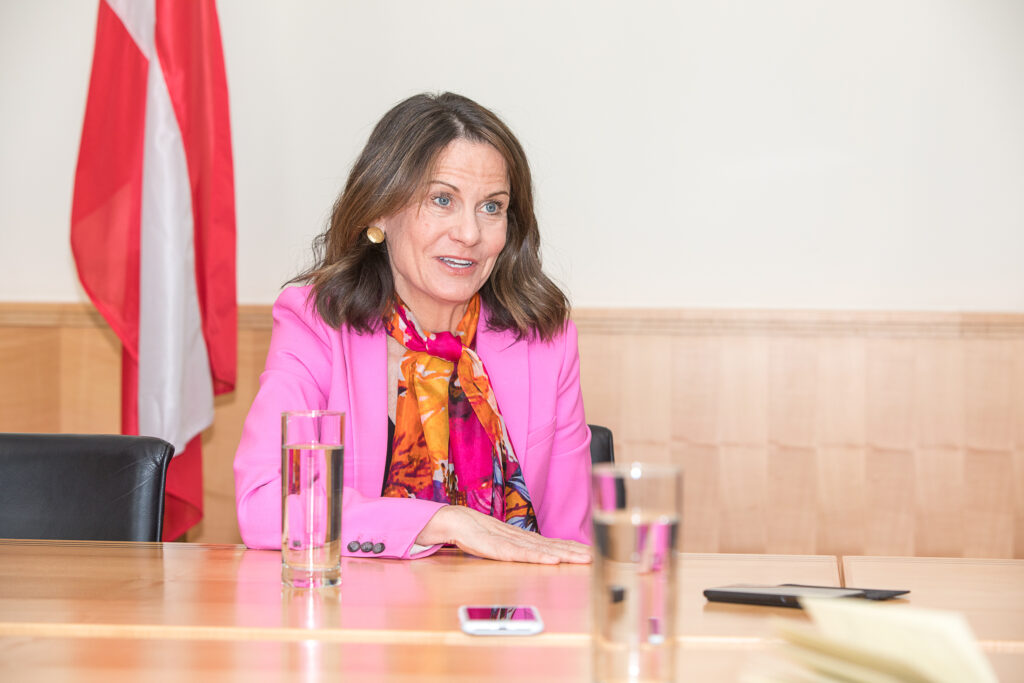SOCIETY spoke with Robin Dunnigan – Chargé d’Affaires of the United States of America to Austria – about the Austrian-American relationship, transatlantic alliances and the Biden administration.
As Chargé d’Affaires of the United States of America to Austria – what were your main tasks, the biggest challenges and how would you describe today’s relations between the USA and Austria?
My responsibilities are pretty much the same ones an Ambassador has, which means mainly managing the already excellent Austrian-American relationship. I like to think of challenges more as opportunities. We have good cooperation on all levels concerning economy, politics, the military, law enforcement and people to people ties. The Biden administration made it very clear, that diplomacy is the key and that the relationship with Austria is a very important one. Austria is one of the top ten fastest growing partners in trade and investment for the USA and we are Austria’s second largest export market, which means more prosperity for everyone. On the side of climate change, I think we also have a real opportunity for cooperation: tackling global warming with all its consequences is one of the top priorities for the Biden administration and it’s also a very high priority for the Austrian government. Last but not least, a lot of people don’t really know about our people to people ties. For example, we have thousands of exchanges every year of academics, doctors, students, researchers, and technological entrepreneurs between Austria and the USA.
Contrary to the former president, President Joe Biden is focusing on “Diplomacy first”. What does this mean for your work as a diplomat but also for the whole foreign policy of the USA?
I think diplomacy is essential in order to be able to tackle the big problems of our time effectively. It means that we look at all these challenges (Covid-19, economic recovery, climate change etc.) from a global point of view. We can’t solve all these problems alone as a nation. We need to cooperate with our allies and partners. As a diplomat who believes in diplomacy and in working together multilaterally, I’m thrilled that the administration has taken that approach.
On April 30, President Joe Biden has been in office for 100 days. How would you summarize his administration’s work and achievements so far?
I believe these 100 days were really remarkable with some landmark achievements. On the domestic side, the President has overseen the administration of over 230 million vaccines so that now more than half of American adults have gotten at least one vaccine shot. He has put forward an economic package to help those Americans that have been hurt the most by the pandemic and a major infrastructure bill.
On the foreign policy front I think the work has been equally impressive in speed, impact, and quantity. On his very first day, the President signed the papers to rejoin the Paris Agreement and he recently hosted the Leaders’ Summit on Climate Change in April, which also Minister Gewessler attended. Further, he extended the New START treaty, which is the only instrument we have to manage the nuclear relationship between the USA and Russia. The USA recommitted to the World Health Organization (WHO) and committed 4 billion dollars to Covax, a world-wide initiative which works for global equitable access to COVID-19 vaccines. Another big achievement on the foreign policy front is the commitment to having democracy, human rights and the rule of law be a real part of our foreign policy. This means reengaging with the UN Human Rights Council and many other multilateral fora, we hadn’t been strong with in the past. So much has happened in such a short time and I don’t really see the pace slowing.
Looking at his presidency from a people’s point of view: Foreign policy is always very consistent across administrations. The relationship between America and the EU are strong enough to withstand changes. We already had a great relationship with Austria, and this President will continue to build on that. The real difference concerning foreign policy is the shifted core belief, that diplomacy and working together is our best bet on solving the challenges of the 21st century.
How important is a functioning partnership between Europe and the USA? How is President Biden’s approach in this regard?
The administration across the board and the President have made clear how important the relationships with EU member states, NATO allies, and other bilateral relationships are. Our economic relationship is the most globally integrated and largest economic relationship on the planet. We have 1.3 trillion dollars in trade in goods and services. The trade in investments between Europe and the USA create 15 million jobs for Americans and Europeans. This economic relationship binds us in a really important way, which will affect every European and American. Another aspect would be the shared commitment to a Western way of life, democratic values, the respect of the rule of law and certain norms. We have a shared history and security in the form of NATO.
All of these aspects combined with the belief of our administration that diplomacy and the transatlantic alliance are essential in order to tackle a set of global problems like Covid-19, climate change and economic recovery means that the transatlantic partnership is the most important relationship in order to bring forth the needed change in this world.
Do you think Covid-19 has changed the world and if yes in which way?
The fact that this pandemic has changed the world is undebatable. It has affected the economy, our way of life and work. It’s a good reminder to see how interconnected our globalized world is. The outbreak of a disease in one country becomes a globally shared challenge. Therefore, I’m really pleased that we have recommitted to the World Health Organization. The pandemic is a huge reminder that we need to work together in all available multilateral ways.
Photos: SOCIETY/Pobaschnig



